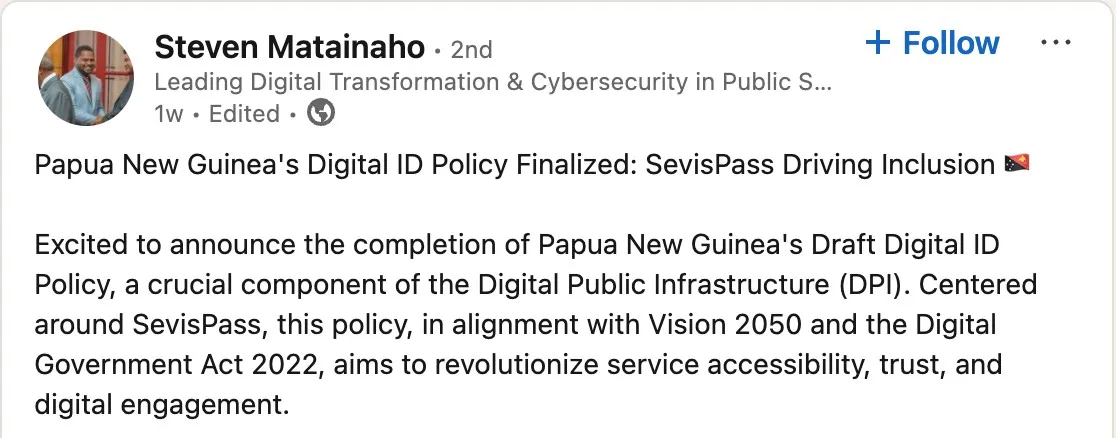|
Getting your Trinity Audio player ready...
|
Digital identity is no longer a buzzword; it’s the foundation of the rapidly growing digital economy. Most governments are spending millions of dollars to implement new initiatives that provide their citizens with digital IDs, with the latest being Liberia, Papua New Guinea, Uganda, and Guinea-Bissau.
Papua New Guinea unveils new DPI draft policy
Papua New Guinea’s government has unveiled a draft policy that outlines its roadmap for a digital public infrastructure to “revolutionize service accessibility, trust, and digital engagement.”
Known as the Draft Digital ID Policy, it was developed to align with the island nation’s Vision 2050 and to comply with the Digital Government Act 2022.

ICT Minister Timothy Masiu first announced the draft policy in December 2024 to unify digital identity for PNG’s 10.8 million citizens. He stated that the aim was to boost the country’s digital economy and enable every citizen to participate while also addressing inefficiencies in public service delivery.
Drafting of the policy has now been completed, and according to Steve Matanaiho, who heads the country’s Department of Information and Communications Technology (DICT), it’s designed to promote inclusion, interoperability, and privacy.
On inclusion, the policy advocates for multilingual support to guarantee no citizen is locked out. PNG is one of the world’s most linguistically diverse countries, with over 800 languages spoken; this makes it home to over 10% of the world’s languages despite only accounting for 0.13% of the global population.
The new ID will be built around SevisPass, an initiative to digitize existing physical IDs linked to “a digital ecosystem of public and private services.” Launched in October, SevisPass is stored on the SevisWallet. PNG partnered with the UN’s Department of Economic and Social Affairs and the International Telecommunications Union on the initiative.
The digital ID will be rolled out in a phased implementation over the next 18 months, with completion aimed for December next year.
Guinea-Bissau to digitize IDs, birth registrations
Elsewhere, Guinea-Bissau aims to digitally overhaul its national ID and birth registration system in an initiative supported by the UNDP and UNICEF.
Three months ago, the West African nation launched the Integrated System of Citizen Registers and Statistics (SIREC), a new system to digitally record new births and IDs and to digitize existing records.
According to Raul Gomes, who heads the country’s civil registration at the Ministry of Justice, Guinea-Bissau intends to integrate the birth registration system with other vital services like health and education.“The government and its partners are making significant efforts to move civil registration services to the most remote areas to register children. In health facilities as well, we are training health technicians so that they can carry out birth registration themselves,” Gomes told one outlet.
He added that nearly half of all children below the age of five are registered. Guinea-Bissau is home to 2.25 million residents, with just under 300,000 estimated to be below five.
Unlike most of its peers in West Africa, Guinea-Bissau already has a biometric ID card system, which it first launched in 2006. In 2014, it upgraded the system to meet regional standards set by the Economic Community of West African States (ECOWAS), becoming the second state to issue the new digital IDs after Senegal.
The ongoing initiative is expanding this existing system to meet the latest standards and to encompass a wider range of services. Besides the UN, it’s supported by the Swiss government.
Gomes acknowledged challenges impeding faster rollout, including limited funding and low internet penetration. However, he believes that the West African country is on the right track with support from its bilateral partners.
Limited funding is not unique to Guinea-Bissau. In neighboring Liberia, thousands of residents in the northern county of Nimba have swarmed the only digital ID enrolment center in the region. The country, whose economy is among the smallest in the region, has failed to allocate the funding to establish new centers, blaming it on a cash crunch.
Watch: Digital identity is a core part of Web3—here’s why

 08-29-2025
08-29-2025 





